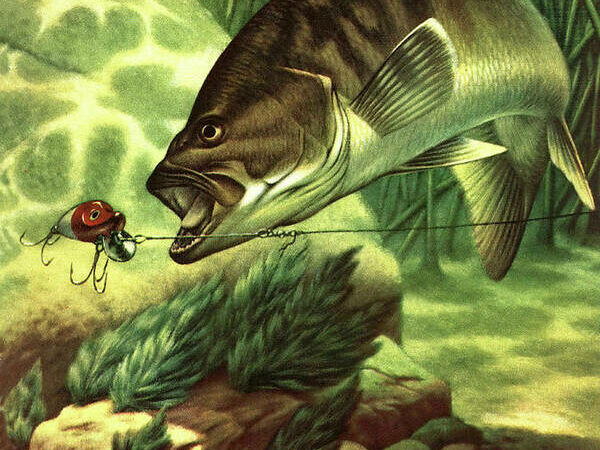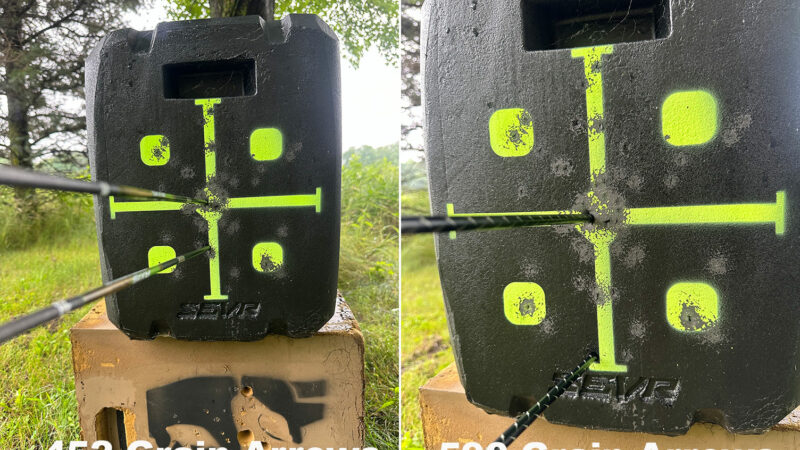How to Fish a Jerkbait Like a Pro
We may earn revenue from the products available on this page and participate in affiliate programs. Learn More ›
You rarely get a love tap when you’re fishing a jerkbait. In fact, a jerkbait bite is usually more of an arm-jarring blast. These hard-plastic and wood baitfish imitators have been fooling freshwater predators for decades. But thanks to modern technology, jerkbaits have become more lethal than ever before. Still, not all anglers know how to fish a jerkbait properly.
These baits are available in a wide range of sizes, though models measuring between 4 and 6 inches are arguably the most versatile, capable of fooling everything from trophy bass to giant pike to monster trout and walleyes. At face value, jerkbaits look simple enough—they feature a diving lip which takes them down to a preset depth. But unlike crankbaits that are cast and retrieved steadily, jerkbaits require a ripping or whipping action with the rod tip to come alive. That motion is simple enough to learn but choosing the right jerkbait and getting the most out of it can be a bit more complicated, especially with so many available options. These pointers will get you on the fast track to jerkbait glory.
Pay Attention to Suspension
Almost every company that produces hard plastic lures makes a jerkbait. If you were to put models from a dozen different brands on a table in front of you, you’d probably say they all look about the same. And you’d be correct. While aesthetics, exterior design, and features don’t change drastically from one brand to the next, but with jerkbaits it’s all about inner beauty.
Make no mistake, there’s not really such a thing as a bad jerkbait, per se. They’ll all catch fish in the right circumstances, but the most versatile and most proven type of jerkbait is one that suspends, meaning once it reaches maximum diving depth, it’ll either hover in place or rise very, very slowly back to the surface. This suspension is important, because it allows you to keep a jerkbait in the zone and in front of fish longer during the retrieve. When the water is cold, this function is especially important because fish will often attack during a long pause when the lure is doing absolutely nothing.
But, if you pause and the lure shoots up like a cork, there’s a good chance fish holding at its diving depth won’t be willing to chase it up. Good suspension is so critical in jerkbaits that it takes engineering interior weight systems and specialized body chamber designs to achieve it. This also explains why the better a jerkbait’s suspension, the more it costs at the tackle shop.
Jerkbaits like Megabass’s Vision ONETEN, Lucky Craft’s Pointer, and the 6th Sense Provoke are hailed as some of the best and most consistent suspenders, but they’re also some of the highest priced on the market. Don’t want to spend $16 or more on a jerkbait? Don’t fret. For less than $10, you can help any jerkbait at any price mimic these suspension aces.

Right on the Dot
I fish jerkbaits all season long. From early spring smallmouths, to winter brown trout, to summer pickerel, they’ve been one of my favorite weapons for many years. And while I own some of the fancy, high-end baits, my all-time favorite is the very affordable Smithwick Suspending Super Rouge Jr. This lure suspends pretty well out of the package, but with the addition of two Suspendots on the belly, it hovers at depth like a champ. I am never without Suspendots when I’m fishing with jerkbaits.
These little, round lead stickers are sold in sheets. Likewise, you can also buy packs of longer, rectangular lead SuspendStrips. You can add or subtract as needed throughout the day or as the depth changes. In my opinion, they’re invaluable. Even a jerkbait with a buoyant balsa wood body that will rise incredibly fast on the pause can be made to hover with the addition of a few dots. Will these sticky saviors make any lure hover perfectly? No. But even if you decrease the rate of ascent a little bit you can score a lot more fish.
Read Next: Best Jerkbait Rods
Easy on the Throttle
Photo by Joe Cermel
If you really want to learn how to fish a jerkbait, you first must understand that jerkbaits trigger reaction strikes. Jerkbaits combine flash, rattles, and erratic movements to coax predators into hitting on instinct, not always out of pure hunger. Sometimes the secret sauce is an aggressive retrieve start to finish, where you’re whipping the rod tip almost non-stop as you reel. In cases where fish are highly charged up and looking to kill a fast-moving target, suspension has less benefit. But that’s not how jerkbaits should be fished most often.
What many anglers fail to realize is that it doesn’t take their full strength to make a jerkbait dance. In fact, it’s quite the opposite. If you were fishing in 6 feet of water with a jerkbait rated to dive to five feet, you’d want to whip the rod hard three to five times immediately to get the lure to depth, but once it’s there, it’s a game of finesse. The slightest tap of the rod tip will make a hovering jerkbait glint, turn, or shimmy without advancing it too far forward. Meanwhile, harder whips will make it move ahead as well as farther out to either side. The bottom line is that the beauty of a jerkbait is it lets you dial in the cadence, level of action, and length of pause that will score bites, yet newer anglers often want to reel steadily or overwork these baits.
Read Next: These 3 Classic Jerkbaits Are Still the Best for Bass and Trout
Recently, while fishing on the Niagara River, I found that a few hard rips followed by a 10-second pause was the formula that made big smallmouths (up to 6 pounds) attack. They never hit while the lure was in motion, only on the long, dead stop. So experiment with how to fish a jerkbait on your own waters.
Remember that no matter how fast, slow, hard, or gently you’re working a jerkbait, it’s critical to keep a tight line so you feel a bite instantly and can nail a powerful hookset.
The post How to Fish a Jerkbait Like a Pro appeared first on Outdoor Life.
Source: https://www.outdoorlife.com/fishing/how-to-fish-a-jerkbait/





